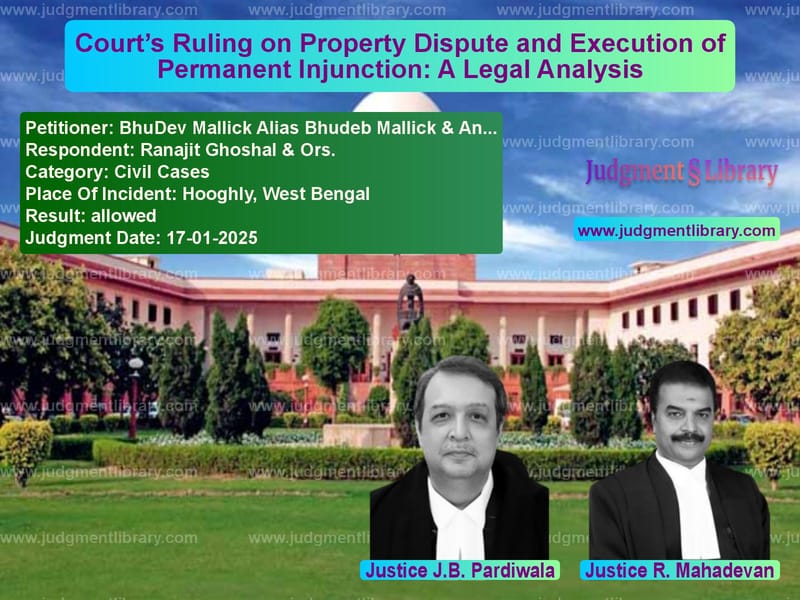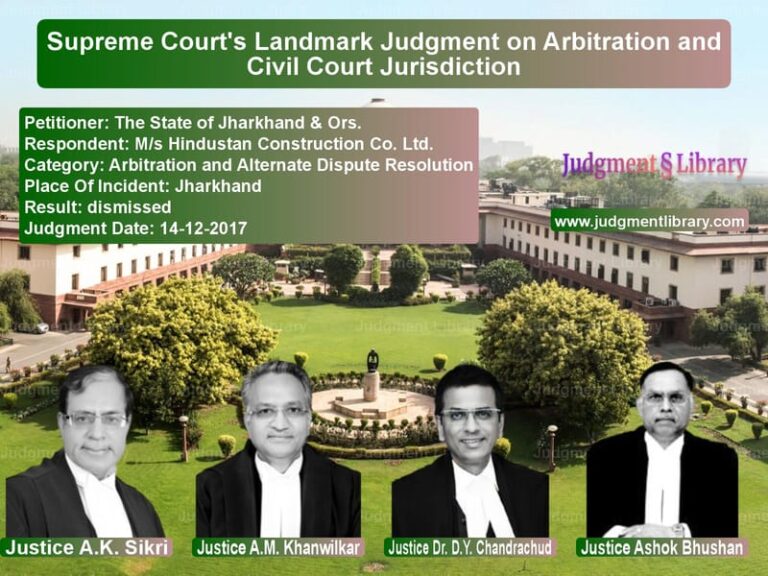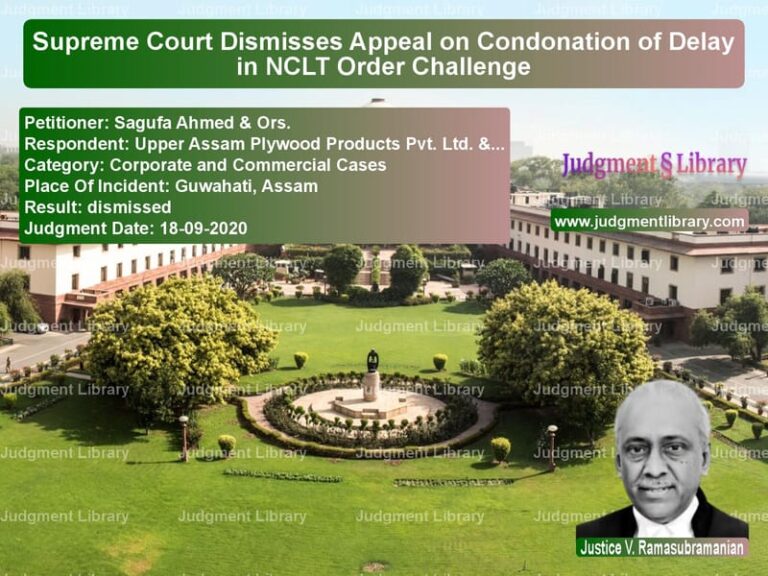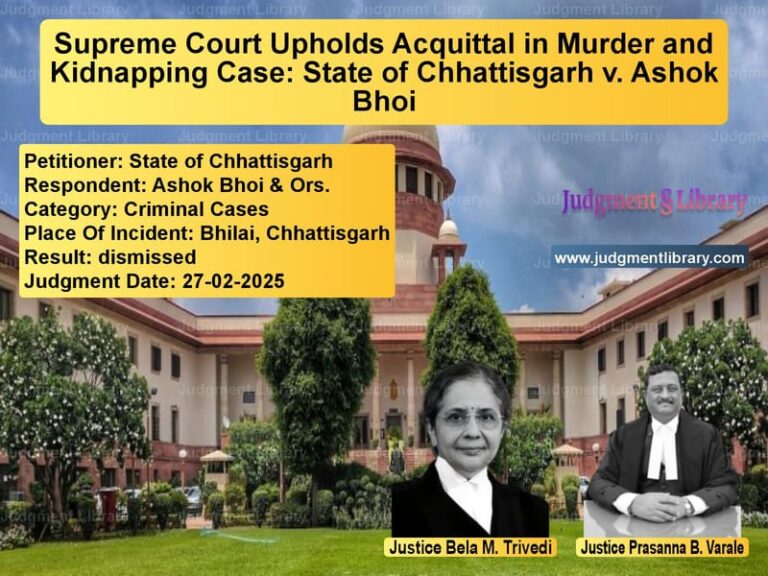Court’s Ruling on Property Dispute and Execution of Permanent Injunction: A Legal Analysis
The Supreme Court of India recently rendered a significant judgment in the case BhuDev Mallick Alias Bhudeb Mallick & Anr. v. Ranajit Ghoshal & Ors., addressing the complexities involved in the execution of a permanent injunction decree in property disputes. This appeal arises from a revision application filed against the decision of the High Court, which upheld the executing court’s order of arrest and detention of the appellants in civil prison for violating a decree of permanent injunction that had been passed more than 40 years ago.
The appellants, who were defendants in the original suit, were challenged by the decree-holders, the legal heirs of the original plaintiffs of the Title Suit No. 25 of 1965. The issue at the heart of this case was whether the execution of a permanent injunction decree, which was granted in 1976, could still be enforced after such a long delay and whether the appellants could be detained in civil prison for contempt of court for violating the injunction. This case also raised questions about the procedures required for executing such decrees under the Code of Civil Procedure, particularly the application of Order XXI, Rule 32, and Rule 11-A.
Background of the Case
The original Title Suit No. 25 of 1965 was filed for confirmation of possession and, in the alternative, for recovery of possession based on title to the suit property. The decree passed in favor of the plaintiffs (decree holders) declared their title to the suit properties and permanently restrained the defendants from disturbing their peaceful possession. The decree was contested, and an appeal was filed by the appellants in 1976. However, it is unclear what happened to that appeal, but it was settled in 1980, and the appellants claim that they were never dispossessed.
Read also: https://judgmentlibrary.com/supreme-court-ruling-on-stamp-duty-valuation-in-property-transactions/
In 2017, after nearly 40 years, the decree holders filed an execution petition claiming that the appellants had been violating the decree by interfering with their possession. The appellants were served with summons and later filed objections. However, the executing court passed an ex parte order of detention in civil prison for 30 days, along with an order for the attachment of the appellants’ property, which led to this appeal.
Key Legal Issues
- Whether an execution petition can be filed after such a long period (40 years) from the date of the original decree.
- Whether the appellants could be detained in civil prison for violating a permanent injunction decree in a property dispute after such a significant delay.
- The applicability of Order XXI, Rule 32, which deals with the enforcement of injunction decrees and whether it permits arrest and detention in civil prison.
- The requirement of filing an affidavit under Order XXI, Rule 11-A for arrest and detention of the judgment-debtor.
Arguments of the Parties
Petitioner’s Arguments
The appellants, represented by their counsel, raised several points:
- The execution petition filed by the respondents was not maintainable after 40 years. A long delay in filing for the enforcement of a decree, especially when the decree-holders had not sought relief in previous years, undermines the urgency of the matter.
- The appellants had been in continuous possession of the property, and there had been no disturbance by the decree holders to their possession over the years. Therefore, the allegations of violation were baseless.
- The order for arrest and detention was made without giving the appellants an adequate opportunity to present their objections and without following the correct procedures under the Civil Procedure Code.
- Under Order XXI, Rule 11-A, an affidavit must accompany the application for arrest, stating the grounds for the request. In this case, the respondents failed to do so, rendering the execution application defective and improper.
Respondent’s Arguments
The respondents, represented by their counsel, countered the appellants’ claims with the following points:
- The execution petition was rightly filed despite the passage of 40 years because the decree for permanent injunction remained in force, and the appellants had willfully violated the terms of the decree by disturbing the possession of the property.
- The respondents’ claim that the appellants had violated the decree by interfering with their possession was backed by evidence, including police reports and other official documents.
- The appellants had not taken the necessary steps to obey the decree, and their refusal to comply with the injunction warranted the action of arrest and detention in civil prison.
- According to the provisions of Order XXI, Rule 32, the execution of an injunction decree can involve the detention of the judgment-debtors in civil prison if they wilfully disobey the decree. The appellants had been provided with ample opportunities to obey the decree but chose not to do so.
Supreme Court’s Observations
The Supreme Court reviewed the arguments and the legal provisions, making the following key observations:
“It is well settled that a permanent injunction decree, if violated, can be enforced by detention in civil prison. However, for such an order to be made, it is imperative that the party against whom the decree is being enforced must have wilfully failed to comply with the decree despite having had the opportunity to do so.”
The Court observed that while the respondents had made allegations of violation of the decree, they failed to provide concrete evidence to prove that the appellants had wilfully disobeyed the decree. The Court also noted that the respondents did not file the necessary affidavit as required under Order XXI, Rule 11-A, which mandates that grounds for arrest must be stated clearly in the application for execution.
The Court further emphasized that the execution of a decree, especially one involving detention in civil prison, should be done with due care and diligence. In this case, the executing court had acted hastily without properly examining whether the appellants had the opportunity to comply with the decree or whether they had wilfully disobeyed it.
Final Judgment and Directions
The Supreme Court ruled in favor of the appellants and set aside both the order of the executing court and the order passed by the High Court. The key aspects of the judgment were:
- The execution petition filed by the respondents was not maintainable after 40 years from the passing of the decree.
- The appellants were not given a proper opportunity to present their objections and were not provided with a fair hearing before the ex parte order of arrest and detention was passed.
- The Court emphasized that for a detention order under Order XXI, Rule 32, the executing court must be satisfied that the judgment-debtor had wilfully disobeyed the decree. In this case, the respondents had failed to provide sufficient evidence of such wilful disobedience.
- The Court also noted that the failure to file an affidavit as required under Order XXI, Rule 11-A, made the execution petition defective.
- The Court set aside the orders passed by both the High Court and the executing court, allowing the appeal.
Implications of the Judgment
This ruling reinforces the importance of following proper procedures in the execution of decrees, particularly in cases involving detention in civil prison. The judgment clarifies that the executing court must ensure that the judgment-debtor has had the opportunity to comply with the decree and must only pass orders of detention if it is clear that the debtor has wilfully disobeyed the decree. Additionally, the Court’s focus on the affidavit requirement under Order XXI, Rule 11-A highlights the need for strict compliance with procedural safeguards in execution proceedings.
Read also: https://judgmentlibrary.com/supreme-court-upholds-possession-rights-in-karnataka-property-dispute/
Conclusion
The Supreme Court’s ruling in BhuDev Mallick Alias Bhudeb Mallick & Anr. v. Ranajit Ghoshal & Ors. emphasizes the necessity for clear, concrete evidence in execution cases, especially when severe measures like detention in civil prison are being considered. The judgment ensures that the rights of the judgment-debtors are protected by upholding the principles of fairness, providing them with an opportunity to present objections, and ensuring that the execution of decrees follows the due process of law.
Petitioner Name: BhuDev Mallick Alias Bhudeb Mallick & Anr..Respondent Name: Ranajit Ghoshal & Ors..Judgment By: Justice J.B. Pardiwala, Justice R. Mahadevan.Place Of Incident: Hooghly, West Bengal.Judgment Date: 17-01-2025.
Don’t miss out on the full details! Download the complete judgment in PDF format below and gain valuable insights instantly!
Download Judgment: bhudev-mallick-alias-vs-ranajit-ghoshal-&-or-supreme-court-of-india-judgment-dated-17-01-2025.pdf
Directly Download Judgment: Directly download this Judgment
See all petitions in Property Disputes
See all petitions in Contract Disputes
See all petitions in Consumer Rights
See all petitions in Judgment by J.B. Pardiwala
See all petitions in Judgment by R. Mahadevan
See all petitions in allowed
See all petitions in supreme court of India judgments January 2025
See all petitions in 2025 judgments
See all posts in Civil Cases Category
See all allowed petitions in Civil Cases Category
See all Dismissed petitions in Civil Cases Category
See all partially allowed petitions in Civil Cases Category







